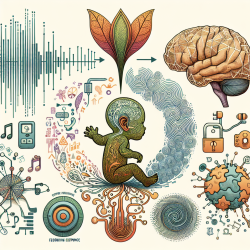The journey of child development is marked by significant milestones, particularly in the realm of auditory processing and speech encoding. A recent study titled "The effect of child development on the components of the Frequency Following Response: Child development and the Frequency Following Response" sheds light on how these processes evolve with age. This research offers valuable insights for practitioners looking to refine their skills in auditory assessments.
Understanding Frequency Following Response (FFR)
The Frequency Following Response (FFR) is an evoked potential that provides a window into the subcortical and cortical structures' response to speech stimuli. It is a critical tool for assessing how speech sounds are encoded by the auditory system. The maturation of the Central Auditory Nervous System (CANS) plays a pivotal role in this process, influencing both spectral and temporal processing of verbal sounds.
Key Findings from the Research
The study involved 98 participants ranging from newborns to children aged 8 years and 9 months. The research highlighted several key findings:
- Latency and Amplitude Changes: As children age, there is a significant decrease in latency and an increase in amplitude of FFR waves. This indicates more efficient neural processing as the CANS matures.
- Slope Measure: An increase in slope measure with age was observed, suggesting improved time-to-magnitude ratio of neural responses.
- Maturation Impact: Younger infants show less robust responses when encoding speech compared to older children who have more stable and well-organized FFR responses.
Implications for Practitioners
The findings underscore the importance of considering age-related changes when assessing auditory function in children. Practitioners can enhance their skills by:
- Incorporating FFR Assessments: Utilize FFR as a tool to objectively analyze speech sound encoding across different developmental stages.
- Acknowledging Maturation Phases: Recognize that significant neural changes occur during infancy, which can impact auditory processing outcomes.
- Pursuing Further Research: Encourage ongoing research into how environmental factors and sensory experiences influence auditory pathway maturation.
The Path Forward
This study highlights the dynamic nature of neural encoding during child development. By integrating these insights into practice, clinicians can better support children’s communicative development. For those interested in delving deeper into this topic, further exploration of environmental influences on auditory processing is recommended.










